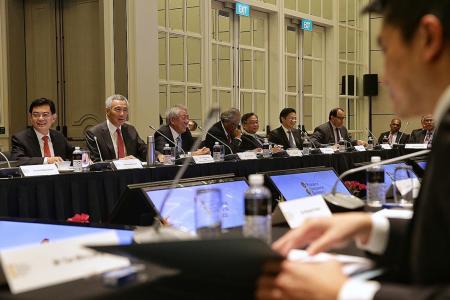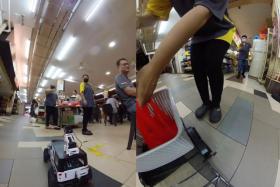Over $700 million to go into food, medicine, digital research: Heng Swee Keat
Food, medicine and digital technology will form the backbone of Singapore's long-term research plans, says Minister Heng Swee Keat
The future of food, medicine and digital technology will form the backbone of long-term research plans to keep Singapore competitive, Finance Minister Heng Swee Keat said yesterday.
But these goals will not be at the expense of basic research, which takes longer to bear fruit, he said as he gave an update on Singapore's research progress and future plans.
Mr Heng, who chairs the National Research Foundation, announced that over $700 million will go into the three areas.
The funds are part of $19 billion that was budgeted in 2016 under the Research, Innovation and Enterprise (RIE) 2020 plan for Singapore's science and technology research over the next five years, with food, healthcare and the digital economy earmarked as research targets.
Mr Heng was speaking to reporters after the RIE Council meeting, together with Prime Minister Lee Hsien Loong, who chairs the council, and fellow council members Mr Chan Chun Sing and Mr Lawrence Wong.
Digital capabilities will get a large chunk: $540 million will be set aside to build up artificial intelligence (AI) systems and meet national cybersecurity needs.
The aim is to create AI systems to identify patients predisposed to chronic diseases like diabetes, robots to perform menial tasks and wearable sensors to provide early intervention for heart failure.
With the top-up, the $19 billion fund will now see a total of $900 million allocated to research and development (R&D) in fields like AI, robotics and supercomputers.
Yesterday, three projects using AI technologies were unveiled to battle it out in a healthcare research challenge that promises funding of up to $20 million for the winner.
They were picked after an initial round was announced in June last year when researchers were given this task: use artificial intelligence (AI) technologies to stop or slow down the worsening of diabetes, high blood pressure and high cholesterol in patients stricken with all the three chronic diseases.
In food research, $144 million will be invested in areas like urban farming and lab-grown meat and $80 million will go towards ramping up cell manufacturing capabilities for cell therapy - hailed as the future of medicine.
Biopharmaceutical manufacturing, which is the production of small molecule drugs and biologics such as proteins, contributes about 4 per cent of gross domestic product and employs more than 7,700 highly skilled workers. So the money will go into programmes to deepen understanding of cell attributes relating to safety and efficacy, and developing technology to assess product quality during manufacturing.
PM Lee said success of the country's research plan will depend on three factors: Singapore must continue to emphasise science and technology in society, develop a strong core of talent, and build partnerships with foreign countries and institutions to pool expertise and take on more ambitious projects.
"We cannot afford to have people fearful and distrustful of science and held captive by totally groundless anti-scientific beliefs," he said.
He noted that Singapore had more than 35,000 research scientists and engineers in 2017, seven in 10 of whom were either citizens or permanent residents. And as far as such scientific talent is concerned, "our doors are wide open", PM Lee said.
"We are talking about maybe hundreds of people, maybe a couple of thousand people," he added.
"If we give the impression that we are not open and we don't welcome talent, and that we are closing in, I think it will be a lot of harm."
FOR MORE, READ THE STRAITS TIMES TODAY
Get The New Paper on your phone with the free TNP app. Download from the Apple App Store or Google Play Store now



